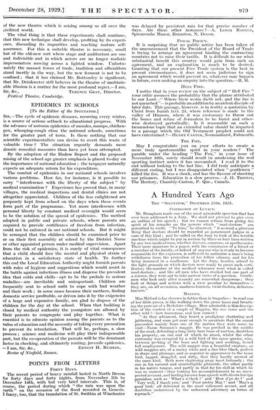A Hundred Years Ago THE " SPECTATOR," DECEMBER 26TH, 1829.
COMMISSION OP LUNACY.
Mr. Brougham made ono of the most admirable speeches that has ever been addressed to a Jury. We shall not pretend to give oven an outline of his speech ; but we cannot refrain from giving the spirit of his remarks on the powers which " mad-doctors " are permitted to wield. "To him," ho observed, " it seemed a grievous thing that doctors should be regarded as paramount judges in a case of this kind ; and he called on the Jury to look at the terrible machine which might be put in motion by three or four lines written by any two medical men, whether doctors, surgeons, or apothecaries. Their mere signature to a paper, with the connivance of a friend or a member of the family, or indeed of anyone who is ready to become responsible for the expenses, is sufficient to authorize a man's being withdrawn from the protection of his fellow citizens, and for his being immured in a madhouse. Let the Jury, besides, attend to the light grounds on which doctors were ready to grant such certi- ficates; the number of the medical witnesses were what is called mad-doctors ; and like all men who have studied but one part of a science, they were apt to take narrow views of a question. Gentle- men who look only after insanity are somewhat dangerous ; they look at things and actions with a view peculiar to themselves— they are, on all occasions, madness-hunters, twist-finders, delusion- fanciers."
MAGPIES.
Miss Mitford is far cleverer in fables than in tragedies : to road one of her little pieces, is like walking down the green lanes and breath- ing the pure air of a Berkshire village. How admirable is this descrip- tion of the contest of a couple of Magpies, the one tame and the other wild !—how humorous, and how correct !
" As they advanced, they heard a prodigious chattering and jabbering, and soon got near enough to ascertain that the sound proceeded mainly from one of the parties they were come to visit—Nurse Simmons magpie. He was perched in the middle of the road, defending a long dirty bare bone of mutton, doubtless his property, on one end of which he stood, whilst the other extremity was occupied by a wild bird of the same species, who, between pecking at the bone and fighting and scolding, found full employment. The wild magpie was a beautiful creature, as wild magpies are, of a snowy white and a fine blue black, perfect in shape and plumage, and so superior in appearance to the tame bird, ragged, draggled, and dirty, that they hardly seemed of the same kind. Both were chattering away most furiously ; the one in his natural and unintelligible gibberish, the other partly in his native tongue, and partly in that for his skill in which he was so eminent—thus turning his accomplishments to an unex- pected account, and larding his own lean speech with divers foreign garnishes, such as ' What's o'clock ? ' and ' How d'ye do ? ' and ' Very well, I thank you,' and Poor pretty Mag ! ' and Mag's good bird,' all delivered in the most vehement accent, and all doubtless understood by the unlearned adversary as terms of reproach."
































 Previous page
Previous page